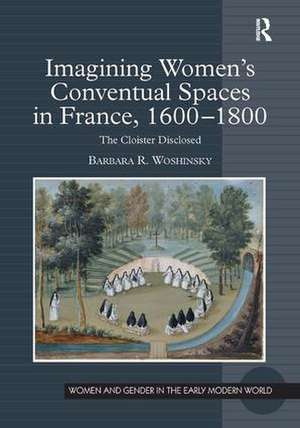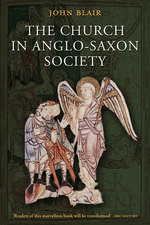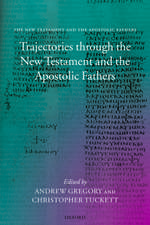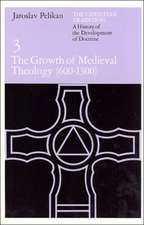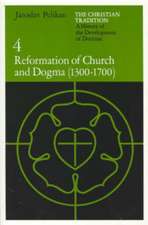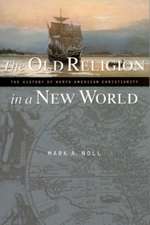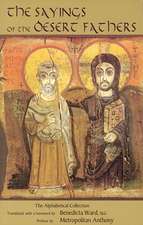Imagining Women's Conventual Spaces in France, 1600�1800: The Cloister Disclosed: Women and Gender in the Early Modern World
Autor Barbara R. Woshinskyen Limba Engleză Hardback – 28 oct 2010
| Toate formatele și edițiile | Preț | Express |
|---|---|---|
| Paperback (1) | 306.22 lei 6-8 săpt. | |
| Taylor & Francis – 14 oct 2024 | 306.22 lei 6-8 săpt. | |
| Hardback (1) | 1068.15 lei 6-8 săpt. | |
| Taylor & Francis – 28 oct 2010 | 1068.15 lei 6-8 săpt. |
Din seria Women and Gender in the Early Modern World
-
 Preț: 225.10 lei
Preț: 225.10 lei - 19%
 Preț: 364.64 lei
Preț: 364.64 lei - 9%
 Preț: 1003.31 lei
Preț: 1003.31 lei -
 Preț: 289.10 lei
Preț: 289.10 lei - 8%
 Preț: 397.61 lei
Preț: 397.61 lei - 18%
 Preț: 1054.71 lei
Preț: 1054.71 lei - 18%
 Preț: 1004.68 lei
Preț: 1004.68 lei - 18%
 Preț: 1054.71 lei
Preț: 1054.71 lei - 18%
 Preț: 1055.06 lei
Preț: 1055.06 lei - 26%
 Preț: 764.20 lei
Preț: 764.20 lei - 26%
 Preț: 764.20 lei
Preț: 764.20 lei - 18%
 Preț: 1001.84 lei
Preț: 1001.84 lei - 18%
 Preț: 1000.27 lei
Preț: 1000.27 lei - 25%
 Preț: 497.08 lei
Preț: 497.08 lei - 18%
 Preț: 1000.27 lei
Preț: 1000.27 lei -
 Preț: 369.73 lei
Preț: 369.73 lei - 18%
 Preț: 1056.63 lei
Preț: 1056.63 lei - 28%
 Preț: 826.01 lei
Preț: 826.01 lei - 18%
 Preț: 1053.92 lei
Preț: 1053.92 lei - 25%
 Preț: 768.30 lei
Preț: 768.30 lei - 28%
 Preț: 819.48 lei
Preț: 819.48 lei - 18%
 Preț: 1113.63 lei
Preț: 1113.63 lei - 25%
 Preț: 767.07 lei
Preț: 767.07 lei - 31%
 Preț: 766.99 lei
Preț: 766.99 lei - 18%
 Preț: 1058.69 lei
Preț: 1058.69 lei -
 Preț: 369.73 lei
Preț: 369.73 lei - 16%
 Preț: 234.90 lei
Preț: 234.90 lei - 18%
 Preț: 1061.81 lei
Preț: 1061.81 lei - 31%
 Preț: 766.85 lei
Preț: 766.85 lei - 18%
 Preț: 1060.25 lei
Preț: 1060.25 lei - 28%
 Preț: 735.34 lei
Preț: 735.34 lei - 18%
 Preț: 1000.27 lei
Preț: 1000.27 lei - 18%
 Preț: 1061.81 lei
Preț: 1061.81 lei - 18%
 Preț: 1061.06 lei
Preț: 1061.06 lei - 28%
 Preț: 876.07 lei
Preț: 876.07 lei - 18%
 Preț: 1064.70 lei
Preț: 1064.70 lei - 18%
 Preț: 1107.61 lei
Preț: 1107.61 lei - 26%
 Preț: 736.38 lei
Preț: 736.38 lei - 18%
 Preț: 1061.06 lei
Preț: 1061.06 lei - 18%
 Preț: 1000.76 lei
Preț: 1000.76 lei - 26%
 Preț: 819.84 lei
Preț: 819.84 lei - 18%
 Preț: 1109.18 lei
Preț: 1109.18 lei - 28%
 Preț: 821.53 lei
Preț: 821.53 lei - 18%
 Preț: 1000.27 lei
Preț: 1000.27 lei - 28%
 Preț: 827.75 lei
Preț: 827.75 lei - 18%
 Preț: 1122.62 lei
Preț: 1122.62 lei
Preț: 1068.15 lei
Preț vechi: 1302.63 lei
-18% Nou
Puncte Express: 1602
Preț estimativ în valută:
204.39€ • 213.97$ • 169.12£
204.39€ • 213.97$ • 169.12£
Carte tipărită la comandă
Livrare economică 07-21 aprilie
Preluare comenzi: 021 569.72.76
Specificații
ISBN-13: 9780754667544
ISBN-10: 0754667545
Pagini: 362
Ilustrații: Includes 26 b&w illustrations
Dimensiuni: 156 x 234 x 21 mm
Greutate: 0.84 kg
Ediția:New ed
Editura: Taylor & Francis
Colecția Routledge
Seria Women and Gender in the Early Modern World
Locul publicării:Oxford, United Kingdom
ISBN-10: 0754667545
Pagini: 362
Ilustrații: Includes 26 b&w illustrations
Dimensiuni: 156 x 234 x 21 mm
Greutate: 0.84 kg
Ediția:New ed
Editura: Taylor & Francis
Colecția Routledge
Seria Women and Gender in the Early Modern World
Locul publicării:Oxford, United Kingdom
Public țintă
AcademicCuprins
Contents: Foreword; Introduction/opening; The body in early modern religious discourse (1). Hermitages of the soul: bodies as allegorical enclosures in Counter-Reformation writing; The body in early modern religious discourse (2) .Living temples or vases of ignominy: Jean-Pierre Camus and the paradoxes of female representation; Thresholds: crossing the boundaries of conventual space; Parlors: the implicated convent; Cells I: forced enclosure, erotic disclosure; Cells II: male appropriations of the nun's persona in Guilleragues’s Lettres portugaises and Diderot’s La Religieuse; Tombs/closing; Works cited; Index.
Notă biografică
Barbara Woshinsky, Professor Emerita at the University of Miami, has authored La Princesse de Clèves: the Tension of Elegance, The Linguistic Imperative in French Classical Literature and numerous articles.
Recenzii
'In this book, Barbara Woshinsky demonstrates her intimate acquaintance with the conventual space as habitat and as architectural construct, not only through historical and literary texts but through personal site visits to present-day women’s communities.' Roxanne Lalande, Lafayette College, USA
'A subtle, well researched and highly readable study of early modern female conventual spaces and the women they sheltered and enclosed. From threshold to cell and tomb, it illuminates with empathy the material and spiritual facets of a unique historical phenomenon and its literary representations.' Malina Stefanovska, University of California at Los Angeles, USA
'This monograph reads like the crowning achievement of a lifetime of study devoted to women’s voices and spaces in real and imagined worlds.' French History
’Woshinsky’s knowledge of the texts is impressive and will serve as a guide to scholars wishing to understand how outsiders, some secular and some religious were viewing the religious life in the convents in the seventeenth and eighteenth centuries ...an impressive piece of work...’ History of Women Religion of Britain and Ireland
'Woshinsky’s close analysis of literary texts provides us with a rich picture of the symbolic place of the convent in the cultural imagination of early modern France. Although previous studies have shown that the convent came to represent the despotism of the Old Regime in the century prior to the French Revolution, Woshinsky’s more expansive treatment provides us with a more nuanced and complex picture of what she calls a convent culture and the ways that ideas about women’s enclosure expressed and were shaped by the changing social and political landscape of the era.' Catholic Historical Review
'A subtle, well researched and highly readable study of early modern female conventual spaces and the women they sheltered and enclosed. From threshold to cell and tomb, it illuminates with empathy the material and spiritual facets of a unique historical phenomenon and its literary representations.' Malina Stefanovska, University of California at Los Angeles, USA
'This monograph reads like the crowning achievement of a lifetime of study devoted to women’s voices and spaces in real and imagined worlds.' French History
’Woshinsky’s knowledge of the texts is impressive and will serve as a guide to scholars wishing to understand how outsiders, some secular and some religious were viewing the religious life in the convents in the seventeenth and eighteenth centuries ...an impressive piece of work...’ History of Women Religion of Britain and Ireland
'Woshinsky’s close analysis of literary texts provides us with a rich picture of the symbolic place of the convent in the cultural imagination of early modern France. Although previous studies have shown that the convent came to represent the despotism of the Old Regime in the century prior to the French Revolution, Woshinsky’s more expansive treatment provides us with a more nuanced and complex picture of what she calls a convent culture and the ways that ideas about women’s enclosure expressed and were shaped by the changing social and political landscape of the era.' Catholic Historical Review
Descriere
Blending history, architecture and literary analysis, this ground-breaking study explores the convent's place in the early modern imagination. After the Council of Trent imposed strict claustral enclosure, the nun became an intensified object of desire in male-authored narratives. Convents also inspired "feminutopian" discourses by women writers. Recent criticism has identified spaces that women have made their own: the ruelle, the salon, the hearth of fairy tales. Woshinsky's book definitively adds the convent to this list.
